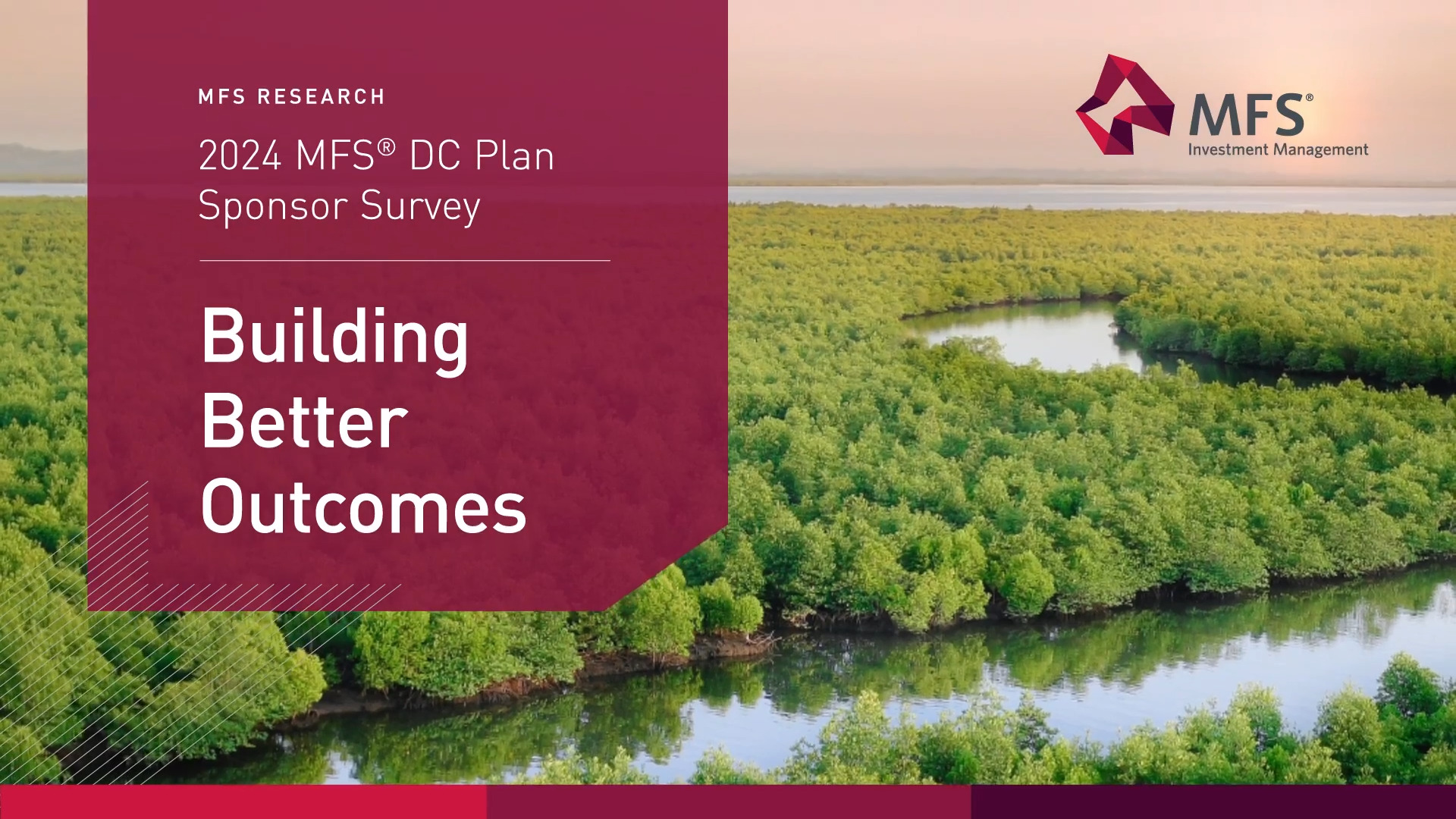2024 MFS DC Plan Sponsor Survey: Retirement Income
Retirement Income - what's the solution? Jeri Savage and Kristen Colvin explore how plan sponsors are thinking about in-plan retirement income solutions and what steps they’re taking to support participant’s long-term financial security.
2024 MFS DC Plan Sponsor Survey: Retirement Income
Retirement Income - what's the solution? Jeri Savage and Kristen Colvin explore how plan sponsors are thinking about in-plan retirement income solutions and what steps they’re taking to support participant’s long-term financial security.
Kristen: In the 2024 MFS DC Plan Sponsor Survey, we tackled everybody’s favorite topic of retirement income. Jeri, what are some of the items we researched when it comes to retirement income in this year’s survey?
Jeri: Kristen, when it comes to retirement income, we wanted to get a better understanding of how sponsors are thinking about the topic. What’s their philosophy around retirement income solutions, what structure are they thinking about when it comes to adding products or solutions to the menu; basically, how are they defining retirement income solutions. Finally, we’ve seen the headlines and wanted to get a better sense of sponsors’ intent to specifically implement in-plan retirement income solutions.
Kristen: So, more about the why versus the what. There is a lot there to unpack. What have we learned when it comes to plan sponsors’ philosophy around retirement income?
Jeri: First, we asked plan sponsors if their plan seeks to retain participant assets in the plan after they retire. We’ve heard over time that sponsors are more willing to encourage their participants to stay in plan after they retire, so we want to quantify it. Our survey results show that 39% of sponsors encourage their participants to stay in plan. 58% say they are neutral about participants staying in plan – they neither encourage them to stay or leave. The remainder do not want their participants to stay in plan.
When asked why they may want to keep participants in plan, 54% say it is to provide access to trusted solutions because it is the right thing to do and 43% say it is to maintain low investment and administrative fees. When you ask sponsors about their reasons for neutrality, 43% say participants are equally supported by accessible, trusted solutions in the plan and outside the plan.
Structurally, we find that over two thirds of plans offer adviser services to employees – either by giving participants access to an advisor and through an in-plan managed account offering. We know from our participant survey that 72% of participants say they would use an advisor is given access to one.
Kristen: Interesting, so a lot of different angles we could talk about there. Let’s focus on the in-plan retirement income solutions. What types of questions did we ask on that topic? What did we learn? And I think one of the great things about this survey is our ability to discern themes based of plan size or other characteristics. What would you highlight there?
Jeri: We know there are a lot of stories in the industry about in-plan retirement income solutions, especially over the last year, making headlines. So in this year’s survey, we asked sponsors first if they have evaluated any in-plan retirement income solutions. Then second, we asked them how likely they are to implement a retirement income solution in the next 12-18 months. And if they said no, we followed that up with asking why they might not be likely to implement in the next 12-18 months.
I’d note a few things. First, yes, many sponsors have evaluated in-plan retirement income solutions.
48% of survey respondents tell us their investment consultant has been educating them on the retirement income landscape. 36% say they’ve had conversations with other asset managers about their solutions and 35% say they’ve had conversations with their target date fund provider about their retirement income solution.
But the second thing I would note is that the evaluation process does not translate directly into action. A majority of sponsors told us they are not likely to implement a retirement income solution
in the next 12-18 months.
17% specifically say they will not implement and 34% said they are not very likely to implement. To follow up on this, when asked why they are not likely or will not implement, the top three reasons given are:
- They are happy with their current plan design,
- There is no participant demand and
- They are waiting for support from recordkeepers.
The final point I’ll make on this topic is that we see differences again when it comes to plan size and type. Plan sponsors that have both DB and DC plans seems a little bit more likely than DC only plans to say they are willing to implement – which may be a little surprising. Only 12% of DC only plan sponsor respondents said they would add a retirement income solution in the next 12-18 months. Then perhaps not as surprising, we find that large plans have a little more willingness than small plans – but again, the numbers are 17% of large plans vs. 10% of small plans.
Kristen: Retirement income has been and will continue to be an important topic in the DC landscape. Thank you for sharing some of the perspectives, especially around decision making to implement retirement income or not. To continue the discussion on this topic or to learn more about the survey results, please visit mfs.com.
60986.1
